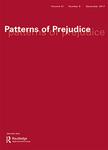版权所有:内蒙古大学图书馆 技术提供:维普资讯• 智图
内蒙古自治区呼和浩特市赛罕区大学西街235号 邮编: 010021

作者机构:Univ Cambridge Dev Studies Cambridge England
出 版 物:《PATTERNS OF PREJUDICE》 (Patterns Prejudice)
年 卷 期:2023年第57卷第3期
页 面:133-160页
核心收录:
学科分类:0303[法学-社会学] 0304[法学-民族学] 0302[法学-政治学] 03[法学] 030201[法学-政治学理论]
基 金:Bill and Melinda Gates Foundation [OPP1144] Bill and Melinda Gates Foundation [OPP1144] Funding Source: Bill and Melinda Gates Foundation
主 题:anti-Muslim racism anti-Muslim tribalism cultural racism Eurocentrism Europe Fulaniphobia Islam Islamophobia Nigeria tribalism
摘 要:One of the leading interpretations of Islamophobia in Europe is anti-Muslim racism. Scholars who conceptualize Islamophobia as a form of racism typically draw on the theoretical framework of cultural racism to contend that Muslims in Europe are discriminated against not only on the basis of religion and culture, but also on the basis of physical features or ancestry. This strand of contention is based on the fact that most Muslims in Europe are non-white immigrants from Asia, Africa and the Middle East and, as a consequence, generally appear phenotypically different from the white majority in European societies. In this article, Ejiofor argues that, even though the theoretical cultural racism framework utilized by some European and other western scholars to analyse Islamophobia in Europe is quite pertinent to some forms of Islamophobia in European or western societies, it does not apprehend the lived experiences of discrimination against Muslims in many non-European societies. Ejiofor contends that the cultural racism framework tends to sidestep the fact that Islamophobia is a global phenomenon that occurs in some non-European societies where colour racism is non-existent, where race & horbar;or racial identity & horbar;is not a relevant social category, and where discrimination against Muslims hardly has anything to do with whiteness or non-whiteness. What, then, does Islamophobia look like in some non-European contexts where racism & horbar;as the term is ordinarily used in Europe to refer to discrimination of peoples based on physical traits or ancestry & horbar;does not make sense? Drawing on the Nigerian context, in which discrimination against Muslims reflects ethnoreligious and ethnoregional conflicts arising from the complex political history of the Nigerian state, Ejiofor posits that Islamophobia in some non-European societies is about tribalism, as it involves the grouping of Muslims into a single tribe and associating Muslimness with terrorism despite the